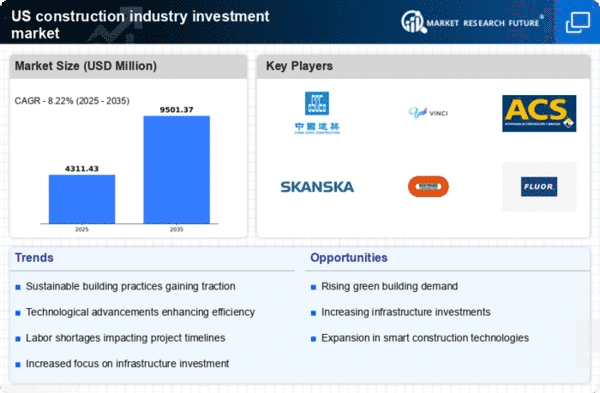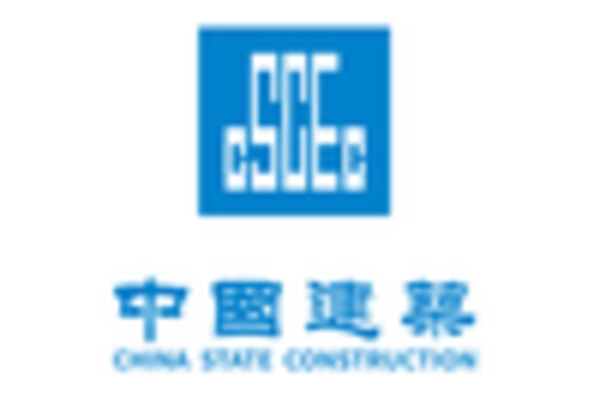Green Building Practices
The adoption of green building practices is becoming a pivotal driver in the construction industry-investment market. With a growing awareness of environmental sustainability, many construction firms are integrating eco-friendly materials and energy-efficient technologies into their projects. According to recent statistics, the green building market in the United States is expected to reach $1 trillion by 2030, reflecting a compound annual growth rate of approximately 10%. This shift towards sustainable construction not only attracts environmentally conscious investors but also aligns with regulatory trends favoring energy-efficient buildings. Consequently, the construction industry-investment market is likely to see increased funding directed towards projects that prioritize sustainability and environmental responsibility.
Urbanization and Housing Demand
Urbanization trends in the United States are significantly impacting the construction industry-investment market. As more individuals migrate to urban areas, the demand for housing and commercial spaces continues to escalate. Recent data indicates that urban populations are projected to increase by over 10% by 2030, necessitating the construction of new residential and commercial properties. This growing demand presents a lucrative opportunity for investors in the construction sector, as developers strive to meet the needs of expanding urban populations. Additionally, the construction industry-investment market is likely to benefit from the increasing emphasis on mixed-use developments, which combine residential, retail, and office spaces to create vibrant communities.
Regulatory Changes and Incentives
Regulatory changes and incentives are playing a crucial role in shaping the construction industry-investment market. Recent policy shifts at both federal and state levels are aimed at stimulating construction activity through tax incentives and streamlined permitting processes. For example, the introduction of Opportunity Zones has encouraged investment in economically distressed areas, leading to increased construction projects. These regulatory frameworks are designed to attract private investment, thereby enhancing the overall growth of the construction sector. As a result, the construction industry-investment market is likely to experience a boost in activity as investors respond to favorable regulatory environments that promote development.
Infrastructure Development Initiatives
The construction industry-investment market is currently experiencing a surge in infrastructure development initiatives across the United States. Federal and state governments are allocating substantial budgets to enhance transportation networks, bridges, and public facilities. For instance, the Infrastructure Investment and Jobs Act has earmarked approximately $1.2 trillion for various projects, which is expected to stimulate investment in the construction sector. This influx of funding is likely to create numerous opportunities for investors, as the demand for construction services rises. Furthermore, the focus on modernizing aging infrastructure is anticipated to drive growth in the construction industry-investment market, as companies seek to capitalize on these government contracts and partnerships.
Technological Integration in Construction
Technological integration is reshaping the landscape of the construction industry-investment market. Innovations such as Building Information Modeling (BIM), drones, and 3D printing are enhancing project efficiency and reducing costs. The construction sector is projected to invest over $10 billion in technology solutions by 2026, indicating a strong trend towards modernization. These advancements not only streamline operations but also improve safety and quality control on job sites. Investors are increasingly drawn to companies that leverage technology to enhance productivity, suggesting that the construction industry-investment market will continue to evolve as firms adopt cutting-edge solutions to remain competitive.
















